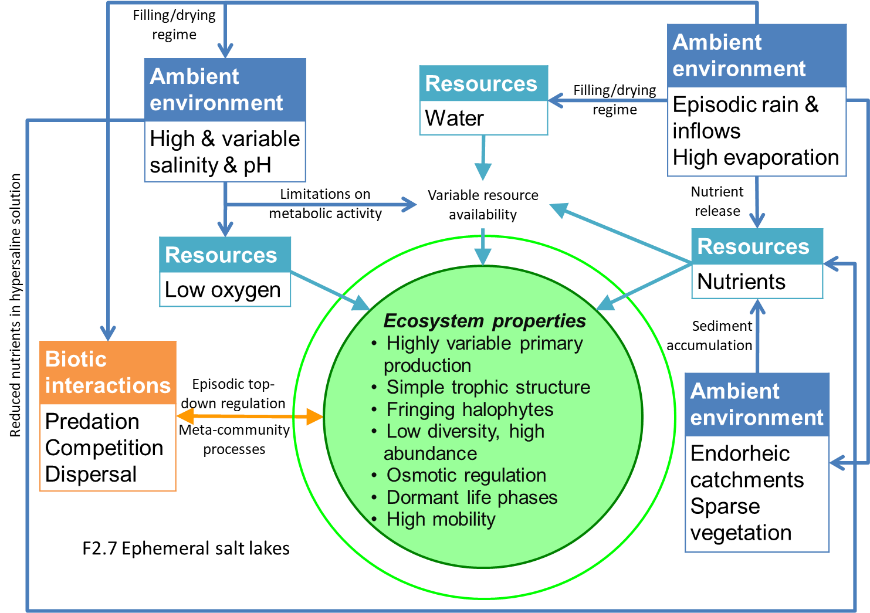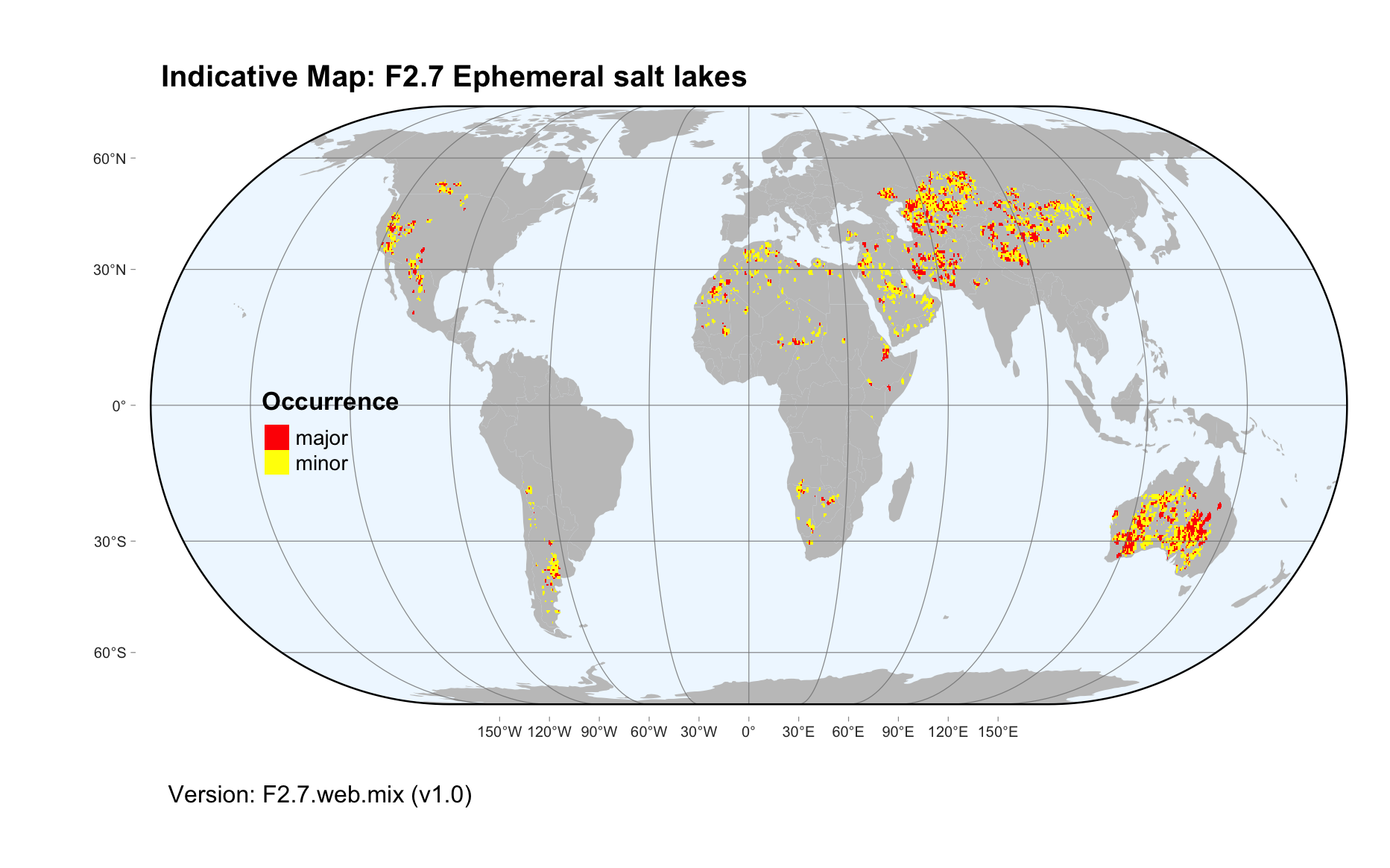Global ecosystem typology
Alternative site for the Global ecosystem typology with additional information for ecosystem profiles and indicative maps.
This site is maintained by jrfep
F2.7 Ephemeral salt lakes
Biome: F2. Lakes biome
Contributors:
(texts)
Ephemeral salt lakes in semi-arid and arid regions are shallow, with extreme variation in salinity during wet-dry cycles that limits life to a low diversity of specialised salt-tolerant species. The lakes are dry and salt-encrusted most of the time, but episodic inundation dilutes salt, allowing high growth of algae and larger plants which support crustaceans, insect larvae, fish and specialist waterbirds. These species use dormant life stages to survive drying, or disperse rapidly to other habitats when the lake dries.
Key Features
Salt lakes with salt crusts in long dry phases and short productive wet phases. Trophic networks are simple but high productivity is driven by bacteria and phytoplankton, supporting specialist birds.
Overview of distribution
Mostly in arid and semi-arid Africa, Eurasia, Australia and North and South America.
Profile versions
- v1.0 (2020-01-20): RT Kingsford; DA Keith
- v2.0 (2020-06-18): RT Kingsford; JT Hollibaugh; K Irvine; R Harper; DA Keith
- v2.01 ():
- v2.1 (2022-04-06): RT Kingsford; JT Hollibaugh; K Irvine; R Harper; DA Keith Full profile available at official site
Main references
Selected references for this functional group:
Seaman MT, Ashton PJ, Williams WD (1991) Inland salt waters of southern Africa Hydrobiologia 210: 75-91
Williams WD (1998) Salinity as a determinant of the structure of biological communities in salt lakes Hydrobiologia 381:191-201
McCulloch G., Aebischer A,Irvine, K (2003) Satellite tracking of flamingos in southern Africa: the importance of small wetlands for management and conservation Oryx 37, 480–483
Diagrammatic assembly model

Maps
Maps are indicative of global distribution patterns are not intended to represent fine-scale patterns. The maps show areas of the world containing major (coloured red) or minor occurrences (coloured yellow) of each ecosystem functional group. See general notes on maps.
There are 2 alternative versions of the indicative map for this functional group, please compare description and sources below.
F2.7.IM.mix_v1.0
Datasets
- HydroAtlas-1.0
- GSW-1.1
- GLWD-2004
- HydroLAKES-1.0
Map references
Linke, S., Lehner, B., Ouellet Dallaire, C., Ariwi, J., Grill, G., Anand, M., Beames, P., Burchard-Levine, V., Maxwell, S., Moidu, H., Tan, F., Thieme, M. (2019) Global hydro-environmental sub-basin and river reach characteristics at high spatial resolution Scientific Data 6: 283 DOI:10.1038/s41597-019-0300-6
Pekel JF, Cottam A, Gorelick N, Belward AS (2016) High-resolution mapping of global surface water and its long-term changes Nature 540, 418-422 DOI:10.1038/nature20584
Lehner, B. and Döll, P. (2004): Development and validation of a global database of lakes, reservoirs and wetlands. Journal of Hydrology 296/1-4: 1-22. Data-set
Messager, M.L., Lehner, B., Grill, G., Nedeva, I., Schmitt, O. (2016) Estimating the volume and age of water stored in global lakes using a geo-statistical approach Nature Communications 13603 DOI:10.1038/ncomms13603
F2.7.web.mix_v1.0

Datasets
- HydroAtlas-1.0
- HydroLAKES-1.0
- GSW-1.1
- GLWD-2004
Map references
Linke, S., Lehner, B., Ouellet Dallaire, C., Ariwi, J., Grill, G., Anand, M., Beames, P., Burchard-Levine, V., Maxwell, S., Moidu, H., Tan, F., Thieme, M. (2019) Global hydro-environmental sub-basin and river reach characteristics at high spatial resolution Scientific Data 6: 283 DOI:10.1038/s41597-019-0300-6
Messager, M.L., Lehner, B., Grill, G., Nedeva, I., Schmitt, O. (2016) Estimating the volume and age of water stored in global lakes using a geo-statistical approach Nature Communications 13603 DOI:10.1038/ncomms13603
Pekel JF, Cottam A, Gorelick N, Belward AS (2016) High-resolution mapping of global surface water and its long-term changes Nature 540, 418-422 DOI:10.1038/nature20584
Lehner, B. and Döll, P. (2004): Development and validation of a global database of lakes, reservoirs and wetlands. Journal of Hydrology 296/1-4: 1-22. Data-set
Check: the Glossary / Profile structure / the public document